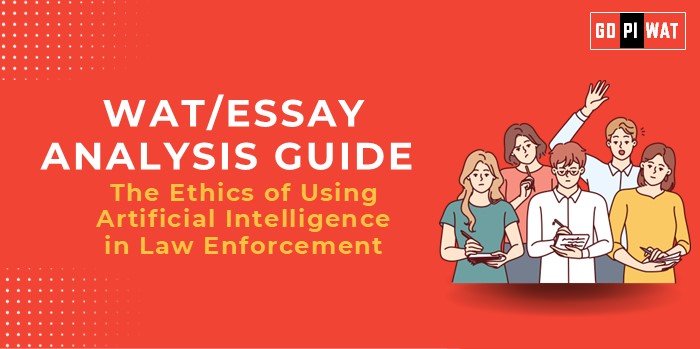📋 The Ethics of Using Artificial Intelligence in Law Enforcement
🌐 Understanding the Topic’s Importance
AI in law enforcement lies at the intersection of technology, ethics, and governance. Its integration promises unprecedented efficiency but also raises concerns about bias, privacy, and accountability. For future leaders, understanding these dynamics is essential in an increasingly AI-driven world.
🗓️ Effective Planning and Writing
- ⏱️ Time Allocation:
- Planning: 5 minutes
- Writing: 20 minutes
- Reviewing: 5 minutes
- 📊 Preparation Tips:
- Research examples of AI usage in law enforcement globally (e.g., predictive policing, facial recognition).
- Understand ethical frameworks such as GDPR and their application to AI.
📝 Introduction Techniques
- ⚖️ Contrast Approach: “While AI boosts law enforcement efficiency, it also raises ethical questions about fairness and accountability, creating a dual-edged scenario.”
- 💡 Solution-Based Approach: “AI can revolutionize law enforcement, but only with ethical frameworks that address privacy and bias.”
📚 Structuring the Essay Body
- 🏆 Achievements:
- ✨ Efficiency Improvements: AI accelerates crime pattern analysis and improves resource allocation.
- 📊 Crime Reduction Metrics: Predictive policing has reduced burglary rates by 20% in some U.S. cities.
- ⚠️ Challenges:
- 🔍 Bias: Algorithms may perpetuate racial or gender biases found in training data.
- 🔒 Privacy Concerns: AI-powered surveillance risks overreach, impacting civil liberties.
- 📋 Regulatory Gaps: Many countries lack robust frameworks for AI governance in policing.
- 🔮 Future Outlook:
- ⚖️ Ethical Guidelines: Develop transparent and unbiased algorithms through regular audits.
- 🌍 Global Governance Models: Leverage GDPR as a foundation for worldwide ethical standards.
📄 Concluding Effectively
- ⚖️ Balanced Perspective: “AI in policing is inevitable, but its ethical adoption will define its success.”
- 🌍 Global Example: “With GDPR as a benchmark, nations can ensure ethical AI deployment in law enforcement.”
📊 Analyzing Successes and Shortcomings
Achievements:
- 🚀 Efficiency: Faster data analysis and streamlined operations.
- 🔒 Crime Reduction: Predictive algorithms have demonstrated measurable success in reducing certain types of crimes.
- 📹 Surveillance Improvements: AI enhances facial recognition accuracy and tracking capabilities.
Ongoing Challenges:
- ⚠️ Bias: Algorithms risk reinforcing systemic discrimination if training data is flawed.
- 📋 Lack of Oversight: Insufficient regulatory measures lead to unchecked usage.
- 💬 Public Trust: Concerns about AI misuse may erode community cooperation.
Global Context:
- 🇪🇺 EU GDPR: Provides a regulatory framework to ensure ethical AI practices.
- 🇨🇳 China: Extensive use of AI in surveillance highlights both its potential and risks.
🌟 Recommendations for Sustainable Progress
- 🧪 Transparent Algorithm Design: Require regular audits to ensure fairness and accuracy.
- 🌍 Global Ethical Standards: Collaborate internationally to create unified guidelines for AI in law enforcement.
- 👨👩👧👦 Citizen Oversight Committees: Engage communities in monitoring and evaluating AI deployment.
📄 Sample Short Essays
- ⚖️ Balanced Perspective: “AI promises efficiency in law enforcement but amplifies ethical concerns like bias and privacy. To ensure fairness, transparent governance frameworks must accompany its deployment.”
- 💡 Solution-Oriented: “AI can transform policing, but only with ethical safeguards like unbiased algorithms and privacy protection, ensuring justice for all.”
- 🌍 Global Comparison: “While China uses AI extensively in surveillance, the EU’s focus on regulation highlights a path toward ethical and accountable use.”


